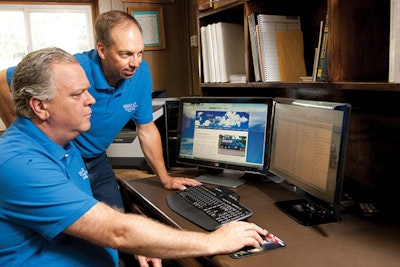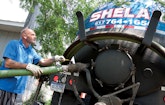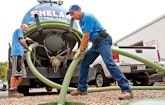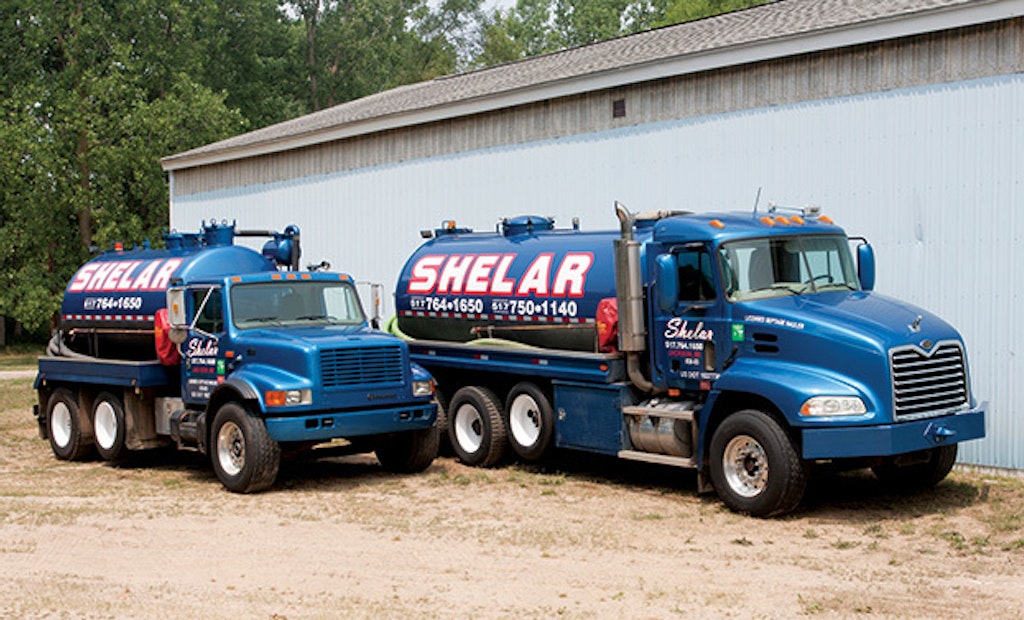Interested in Trucks?
Get Trucks articles, news and videos right in your inbox! Sign up now.
Trucks + Get AlertsA lot has changed in the liquid waste industry since Duane Shelar started helping out around the family business, Shelar Sanitation, as a child some 50 years ago. He has benefitted from watching the industry mature and provide a necessary and vital public service – both efficiently and with environmental protection in mind.
He's pleased with all the changes ... and realizes he and other veteran pumpers need to keep an eye on technological advances and continue to improve. It's a matter of business survival and growth.
"Technological advances in the design and construction of septic systems, along with rapid changes in pumping trucks and equipment have forever altered the way we operate," he says. "Pumper equipment is expensive and subject to a lot of wear and tear, and having the right equipment is vitally important to staying in business."
Started as a septic installation company in 1950 by his father, Art, "with a pick and shovel and a lot of determination," the company quickly got into pumping. "He got tired of waiting for contractors to show up to pump the tanks, so he bought a (vacuum truck)," Shelar says. The elder Shelar was a preacher, and for a time, the pump truck was his family's only vehicle.
"Dad put me in a pumper truck when I got my driver's license,'' Duane Shelar recalls. "I was making $3.50 an hour. We pumped septic tanks for $35 per 100 gallons."
As the company grew, the firm had three crews digging basements and installing septic systems daily. Today, the vast majority of Shelar's work is septic pumping, though he still does some installation. "The installation business is at a crawl now because of the economy and housing market, but the pumping business has remained the same," he says.
ADJUSTING TO THE MARKET
With the future being in pumping, Shelar says he's in the process of updating equipment to last a long time and do a better job.
"The days of medium-duty trucks with one axle are gone for me," he says. "You need to get into over-the-road rigs with big tanks. You can do a lot of pumping and save on wear and tear because you have the right equipment.
"Rigs with tandem axles distribute the overall vehicle weight, which reduces wear and tear and allows for greater hauling capacity. They also provide a smoother ride and increase safety and stability. The heavier diesel engines with exhaust and air brakes reduce maintenance expenses and costly breakdowns."
Experience has made him appreciate a bigger truck because it's designed to make a lot of miles over its lifetime. "You might get 550,000 miles out of a medium-duty truck. My Mack already has 510,000 miles and I think it's going to go to 1.5 million."
As his primary vacuum service truck, the 2001 Mack he bought last year has a 3,600-gallon steel tank with vacuum gear from National Vacuum Equipment, including a 367 cfm water-cooled pump. "That allows the pump to run longer with less wear," he says.
His other hauler is a 1998 International with a 2,500-gallon steel tank with a vacuum pump from Transway Systems and a 250 cfm pump.
Looking forward, Shelar expects his next truck will be a 5,200-gallon quad unit with a 500 cfm pump, perhaps even with a blower. "The industry is going larger and aluminum," he says. "Time is money. You can pump more before spending money on the diesel fuel to drive to the treatment plant."
Shelar serves a several-county area around his home county of Jackson. Only one wastewater plant in Jackson County accepts septage and it charges 15 cents per gallon for disposal. Since regulations require septage be disposed of in its county of origin, he doesn't normally have the option of traveling extra miles for a better price. As an example, a wastewater plant in neighboring Lenawee County charges only 7 cents.
EFFICIENCY THROUGH TECHNOLOGY
Trucks aren't the only technology improvement Shelar has been pursuing. As a regular attendee of the Pumper and Cleaner Environmental Expo International, he has adopted many ideas gleaned over the years. To enhance his continuing education, he also goes to classes and training seminars whenever he can.
"If you embrace some of the technology that's out there, you'll be making more money down the road with less of the stress of running a business," he says.
As for truck equipment technology, Shelar is now using water-cooled heated collars from Wee Engineer that he first saw on the Expo exhibit floor. "It can get really cold in Michigan and the tail end of the truck freezes, the valves freeze," he says. "With those heated collars, I don't have any more broken valves. It's wonderful."
He switched to Garnet digital gauges for precise measurement of the liquid in his tanks. "I also changed to ball valves because they shut off the flow of septage completely. Gate valves have a tendency to leak a little and did not last as long."
Another pumper at the Expo convinced him to start using the Crust Buster tank agitator to improve service efficiency. "He had one on every truck, so I tested one," Shelar says. "Now I have three of them, one on each truck and a spare."
Shelar admits he's not shy about asking questions and talking to others about how they operate. "You can advance your business by doing simple things. It pays to get to know others that work in your industry. We can all benefit from sharing our experiences."
From what he learned at the 2011 Expo, Shelar decided to install a smartphone in his Mack truck, which serves as the main service rig, and is planning to add one to his other truck and any others he buys.
"I can email, text and call right to the truck," he says. "We put in a Bluetooth headset from Big Sky Communications to comply with the new federal laws on cellphone use in commercial vehicles. We can email orders right from the office desk to the truck and don't have to talk to the driver. It saves time and it's a lot safer. I'm still learning how to embrace it."
ROLLING BILLBOARD
Shelar, with his staff – including Ron Davis, Alice Williams and Herman Pollack – is always looking for new ways to promote the business. The company website was updated, and the company employs a wide variety of marketing techniques to reach out to established and new customers.
And Shelar changed his company truck colors this year, as well. The shade of teal he has used for years struck him as kind of dull, so he switched to metallic blue, red and white.
"A pumper truck is a billboard that travels around your entire service area," he says. So he makes sure his name and phone number are boldly displayed. "We wash our trucks religiously and keep our equipment clean," he says. "We get wonderful comments from customers."
He thinks customers have changed over time, making a company's image more important. Most of his customers are over 45 years old, rather conservative, and have certain expectations about a company and its employees presenting themselves in a professional manner, especially for employees going onto other people's property.
"If you want to win, you have to look good and appeal to the masses," he adds. "That means cleaning up and even putting on a suit and tie when it's necessary."
Over time, he says, it all adds up. "You have to put everything you have in your corner to be successful."










